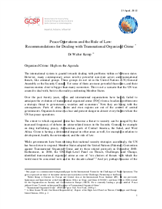BACKGROUND PAPER Peace Operations and the Rule of Law – Recommendations for Dealing with Transnational Organized Crime

The international system is geared towards dealing with problems within or between states. However, many contemporary crises involve powerful non-state actors and transnational threats, like criminal groups. These groups do not sit in the United Nation (UN) Assembly or the Security Council. Yet, some of them are more powerful than states, and their macroeconomic clout is bigger than many economies. This is not a scenario that the UN was created to deal with, but it is the reality confronting Member States.
Over the past twenty years, states and international organizations have largely failed to anticipate the evolution of transnational organized crime (TOC) from a localized problem into a strategic threat to governments, societies and economies. Now they are living with the consequences. Parts of cities, states and even regions are out of the control of central governments. Organized crime is a clear and present danger in almost every theatre where the UN has peace operations. What can the UN and its Member States do to increase their effectiveness in fighting transnational organized crime? This is a big question, and requires an in-depth review of how the UN system is currently dealing with the problem, and what could be improved. That is the focus of an International Peace Institute (IPI) project called ‘Peace without Crime: Towards an Integrated Response to Transnational Organized Crime.’
This paper focuses on one aspect, namely the role of peace operations and the rule of law. As James Cockayne has pointed out in a previous Challenges Forum paper: “peace operations, already thinly stretched, should not now be expected to become the primary or sole provider of the wide range of services needed to tackle organized crime – or the primary developer of such services at the national level”. Nevertheless, they have a significant role in preventing and combating organized crime.

